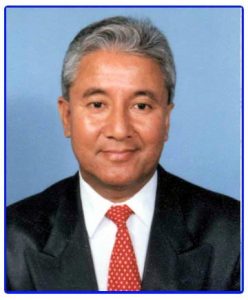Mystics say that there is no tomorrow. All there is now, the present. Yet, ordinary people like us in the everyday

National President 1990
course of living, experience ourselves and others conversing, sharing, taking actions, and believing that there actually is tomorrow or what we call ‘futures’. We are even encouraged by instructors and human resource personnel to set goals for the future, if our life is to mean anything. To accomplish, they emphasize, we need to plan our futures.
What then is the wisdom behind every mystic who insists us to practice with grace, mindfulness exercises, on a regular basis in order to bring our minds to here/now or in the present moment? My interpretation of the mystics is that actions happen in the present moment. In order to become effective in what we are doing, we will need to train our minds to be here in this moment. Our body is here, but we often realize that our mind is dwindling from past to present and from present to the future. It is the very nature of the mind to keep dwindling. The moment we become aware or conscious, we know what is happening to us, our body or inside of our minds. With one foot stepping into the future, having anther foot in the present grants us the power to take actions effectively.
So it is critical to keep watching our minds and the interpretations our minds keep making about everything we see, feel, touch, smell or taste. When we are able to train our minds to be here/now, we become aware of the natural phenomena called day and night, today and tomorrow, or Sunday and Monday. All these are socially constructed meanings so as to be able to coordinate human activities within a certain frame of time. Human beings created everything to mean something so that they could coordinate their actions. This invention we called words, language. We then learned to use our words and languages to craft a vision of the distant futures we called tomorrows. Hence, we identified people as our leaders who possessed the ability to communicate the possible futures for mankind. Not all people seemed to be gifted with this unique ability to see, declare and inspire and persuade the mass to want it.
The purpose of this write up is to share with you, the readers of this column, what it takes for us to learn to lead for tomorrow. Whether we accept ourselves as leaders or not, we are leading ourselves and others in the daily course of our living. We might not have been aware of this phenomena or behaviour of ours.
Most of you who will be reading this column, I believe, shall be young Jaycees for whom the word leader and leadership is something familiar. One of the purposes of your joining this great organization is also to learn the core competencies, knowledge, skills and abilities, to become leaders in your own family, profession and in your communities. So it is natural that you might want to prepare yourselves learning how to lead for tomorrow.
Stephen R. Covey, the author of the ground breaking book, The 7 Habits of Highly Effective People, and one of the world renowned Management Consultant o Fortune 500 Companies, says that the leader of the future, the leader of the 21st century will be one who creates culture or value system centred upon principles. Creating such a culture in business, school, hospital, government, or non-profit organizations, family or any other organization will be a tremendous and exciting challenge in the new era and will be achieved by leaders, be they emerging or seasoned, who have the vision, courage, and humility to constantly learn and grow.
